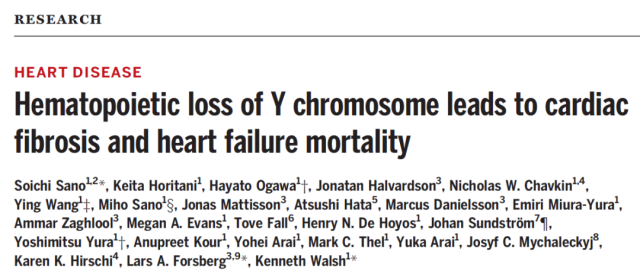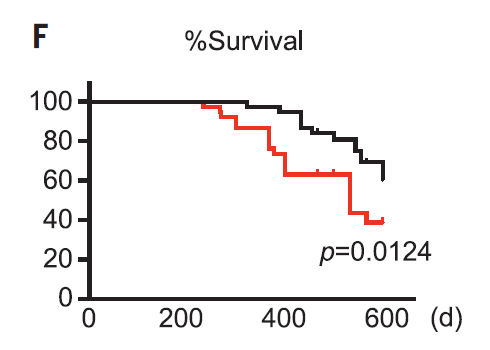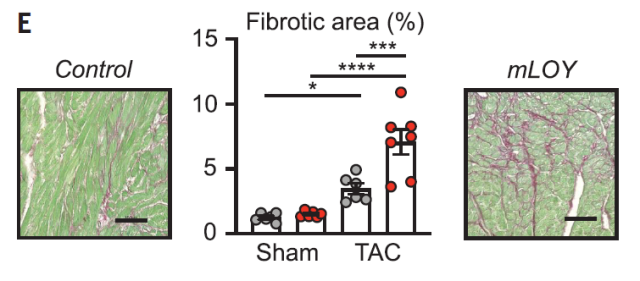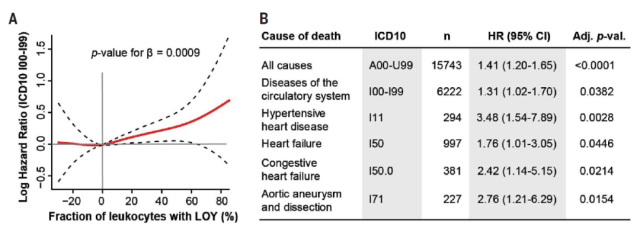The reason why men live shorter than women is related to the loss of Y chromosome?
- Normal Liver Cells Found to Promote Cancer Metastasis to the Liver
- Nearly 80% Complete Remission: Breakthrough in ADC Anti-Tumor Treatment
- Vaccination Against Common Diseases May Prevent Dementia!
- New Alzheimer’s Disease (AD) Diagnosis and Staging Criteria
- Breakthrough in Alzheimer’s Disease: New Nasal Spray Halts Cognitive Decline by Targeting Toxic Protein
- Can the Tap Water at the Paris Olympics be Drunk Directly?
The reason why men live shorter than women is related to the loss of Y chromosome?
- Should China be held legally responsible for the US’s $18 trillion COVID losses?
- CT Radiation Exposure Linked to Blood Cancer in Children and Adolescents
- FDA has mandated a top-level black box warning for all marketed CAR-T therapies
- Can people with high blood pressure eat peanuts?
- What is the difference between dopamine and dobutamine?
- How long can the patient live after heart stent surgery?
Science: The reason why men live shorter than women is related to the loss of Y chromosome?
With the advancement of medical technology, the life expectancy of human beings is gradually increasing, but the life expectancy of women is always longer than that of men .
The population data of many countries in the world show that in all recorded periods, women live longer than men.
Why does it happen?
Scientists have previously observed that not only do men lose hair, muscle and knee cartilage capacity as they age, their cells also begin to lose their Y chromosome . age-related diseases.
On July 14, 2022, the research team of the University of Virginia in the United States published a research paper entitled: Hematopoietic loss of Y chromosome leads to cardiac fibrosis and heart failure mortality in the top international academic journal Science .
The study shows that the loss of the Y chromosome in male animals as they age damages their hearts and eventually leads to fibrosis throughout the body . The discovery will help explain why men on average live shorter lives than women, and provides the first definitive evidence that Y chromosome loss directly has detrimental effects on male health and lifespan.
The research suggests that treatments for Y chromosome loss could help men live longer and healthier lives.

Women are known to have two X chromosomes, while men have one X and one Y chromosome. Compared with the X chromosome, the Y chromosome is somewhat insignificant: it only carries 71 genes, which is less than one-tenth of the X chromosome.
Little is known about the biological role of the Y chromosome beyond sex determination. Therefore, the study of mosaic loss of Y chromosome (mLOY) in blood is helpful to gain insight into the physiological role of Y chromosome.
The mLOY phenomenon usually occurs in cells with a short turnover cycle, blood cells being one of them, but not in germ cells of different developmental origins.
The mLOY phenomenon in hematopoietic cells is the most common postzygotic mutation in leukocytes. The frequency of this occurrence increases with age and smoking status and is associated with clonal hematopoietic status of uncertain potential.
Currently, analyzing a blood sample is the easiest way to detect mLOY. Researchers have found that in about 40% of 70-year- olds and 57 % of 93-year-olds, at least some white blood cells have lost the Y chromosome ; syndrome and other age-related diseases .
In this new study, the research team constructed a hematopoietic mLOY mouse model by using CRISPR-Cas9 gene editing to specifically target the repetitive DNA sequence at the centromere of the Y chromosome to better understand the impact of Y chromosome loss in blood on health.
They performed bone marrow transplants on 38 mice and used CRISPR-Cas9 to knock out the Y chromosome in mouse bone marrow cells, then implanted the altered cells into young male mice whose bone marrow had been transplanted.
An additional 37 control mice also received bone marrow transplants but retained the Y chromosome.

The researchers found that the mice in the experimental group did not completely lose the Y chromosome, and the proportion of Y chromosome loss in their white blood cells was between 49% and 81%, which is similar to the proportion of many elderly men who have Y chromosome loss.
The researchers then observed that over a period of nearly two years, mice lacking the Y chromosome were more likely to die during that time. Only about 40 percent of the mice in the experimental group survived 600 days after transplantation; compared with about 60 percent of the mice in the control group.

In addition, the hearts of mice that lost their Y chromosome were also weaker. After about 15 months, the strength of their heart contractions decreased by nearly 20 percent, and the fibrotic process exploded in the mice’s hearts.
This condition causes the heart to stiffen, impairing its ability to pump blood, which increases the risk of death.

They also found that the mice after bone marrow transplantation did not clear the Y chromosome in the cardiomyocytes, but the macrophages produced in the bone marrow would enter the heart, causing a series of complex reactions in the immune system of the mice, leading to systemic damage. The process of fibrosis. The researchers believe that this tug of war within the immune system may accelerate disease progression.
Something similar may be happening in humans. The researchers then performed three different types of analyzes on DNA data from 15,743 men in the UK BioBank (median follow-up period, 11.5 years) .
They determined that men who lost at least 40 percent of their white blood cells had a Y chromosome were 31 percent more likely to die from circulatory disease compared with men with a higher number of chromosomes.
When the researchers analyzed the causes of death further, they identified several heart conditions, including heart failure .

These findings suggest that treatments targeting Y chromosome loss could help men live longer and healthier lives.
The research team pointed out that pirfenidone (Pirfenidone) may be used as a potential treatment option.
Pirfenidone is a pyridone compound with broad-spectrum anti-fibrotic effects, which can prevent and reverse fibrosis and scar formation. It has been approved by the Food and Drug Administration (FDA) for the treatment of idiopathic pulmonary fibrosis .
The drug is currently in clinical trials for the treatment of heart failure and chronic kidney disease .
Men with Y chromosome loss would respond well to this drug and other anti-fibrotic drugs in development, the team said, but more research is needed to confirm this.
Currently, there is no easy clinical way to determine which men have Y chromosome loss.
Co-corresponding author of the study, Dr. Lars Forsberg of the Department of Genetics and Pathology at Uppsala University , developed a low-cost PCR detection system that, like nucleic acid detection, can detect the loss of the Y chromosome, but currently this The detection method is still in the stage of laboratory use.
Co-corresponding author of the study, Professor Kenneth Walsh of the University of Virginia , believes that if the interest in this research continues and it proves to have utility in the prognosis of the disease in men and leads to personalized treatments, This testing for Y chromosome loss will then become a routine diagnostic test for the foreseeable future.
He also said that as we age, the DNA of all our cells will inevitably accumulate mutations. Therefore, studies examining Y chromosome loss and other acquired mutations hold great promise for the development of personalized medicines tailored to these specific mutations.
Paper link :
https://www.science.org/doi/10.1126/science.abn3100
The reason why men live shorter than women is related to the loss of Y chromosome?
(source:internet, reference only)
Disclaimer of medicaltrend.org
Important Note: The information provided is for informational purposes only and should not be considered as medical advice.



